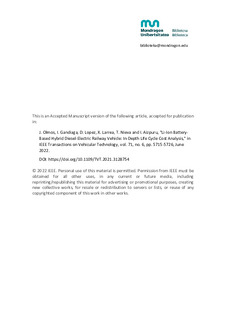Title
Li-ion Battery-based Hybrid Diesel-Electric Railway Vehicle: In-depth Life Cycle Cost AnalysisAuthor
Author (from another institution)
Research Group
Almacenamiento de energíaAccionamientos aplicados a la tracción y a la generación de energía eléctrica
Other institutions
IkerlanConstrucciones y Auxiliar de Ferrocarriles (CAF)
Version
Postprint
Rights
© 2022 IEEEAccess
Embargoed accessPublisher’s version
https://doi.org/10.1109/TVT.2021.3128754Published at
IEEE Transactions on Vehicular Technology Vol. 71. N. 6. Pp. 5715-5726. June, 2022xmlui.dri2xhtml.METS-1.0.item-publicationfirstpage
5715xmlui.dri2xhtml.METS-1.0.item-publicationlastpage
5726Publisher
IEEEKeywords
Rail transportation
Costs
optimization
Mechanical power transmission ... [+]
Costs
optimization
Mechanical power transmission ... [+]
Rail transportation
Costs
optimization
Mechanical power transmission
Energy management
Analytical models
Hybrid power systems [-]
Costs
optimization
Mechanical power transmission
Energy management
Analytical models
Hybrid power systems [-]
Abstract
In this study, the life cycle costs of railway projects involving hybrid diesel-electric vehicles are analysed. Specifically, the analysis focuses on the comparison of 3 lithium-ion battery technologi ... [+]
In this study, the life cycle costs of railway projects involving hybrid diesel-electric vehicles are analysed. Specifically, the analysis focuses on the comparison of 3 lithium-ion battery technologies (NMC, LTO and LFP) and 8 energy management strategies (including rule-based and optimization-based strategies). In order to develop this analysis, a methodology that returns the life cycle cost of each proposed case is presented. The methodology includes the optimization of the diesel generator and lithium-ion battery sizing. A scenario based on a real railway line is introduced, and the obtained results are compared to a traditional diesel-electric railway vehicle to develop a techno-economical discussion. The best lithium-ion battery technologies are found to be LTO and NMC, and the most appropriated strategy a state-machine controller optimised by a genetic algorithm approach. The best case obtains a life cycle cost reduction of the 4.0% and diesel savings of the 13.7% compared to a traditional diesel-electric railway vehicle. The proposed analysis is claimed to be potentially helpful for the cost-optimal design and operation definition of powertrains for hybrid railway vehicles. [-]
xmlui.dri2xhtml.METS-1.0.item-sponsorship
Gobierno Vasco-Eusko Jaurlaritzaxmlui.dri2xhtml.METS-1.0.item-projectID
info:eu-repo/grantAgreement/GV/Programa Bikaintek 2018/20-AF-W2-2018-00010/CAPV//Collections
- Articles - Engineering [708]





















